Fleurs du Mal Magazine


Or see the index
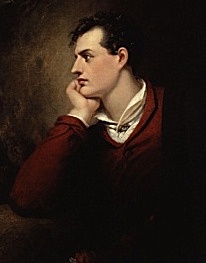
Lord Byron
She Walks In Beauty like the night
She walks in beauty, like the night
Of cloudless climes and starry skies;
And all that’s best of dark and bright
Meet in her aspect and her eyes:
Thus mellowed to that tender light
Which heaven to gaudy day denies.
One shade the more, one ray the less,
Had half impaired the nameless grace
Which waves in every raven tress,
Or softly lightens o’er her face;
Where thoughts serenely sweet express
How pure, how dear their dwelling place.
And on that cheek, and o’er that brow,
So soft, so calm, yet eloquent,
The smiles that win, the tints that glow,
But tell of days in goodness spent,
A mind at peace with all below,
A heart whose love is innocent!
Lord George Gordon Noel Byron (1788 – 1824)
She Walks In Beauty like the night
fleursdumal.nl magazine
More in: Archive A-B, Byron, Lord
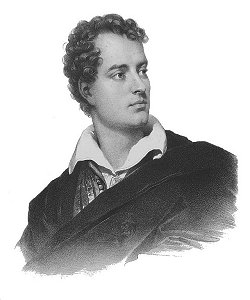
Lord Byron
(1788-1824)
So We’ll Go No More A Roving
So, we’ll go no more a roving
So late into the night,
Though the heart be still as loving,
And the moon be still as bright.
For the sword outwears the sheath,
And the soul wears out the breast,
And the heart must pause to breathe,
And love itself have rest.
Though the night was made for loving,
And the day returns too soon,
Yet we’ll go no more a roving
By the light of the moon.
Lord Byron poetry
fleursdumal.nl magazine
More in: Archive A-B, Byron, Lord

George Gordon (Lord) Byron
(1788-1824)
And Thou Art Dead, As Young And Fair
And thou art dead, as young and fair
As aught of mortal birth;
And form so soft, and charms so rare,
Too soon return’d to Earth!
Though Earth receiv’d them in her bed,
And o’er the spot the crowd may tread
In carelessness or mirth,
There is an eye which could not brook
A moment on that grave to look.
I will not ask where thou liest low,
Nor gaze upon the spot;
There flowers or weeds at will may grow,
So I behold them not:
It is enough for me to prove
That what I lov’d, and long must love,
Like common earth can rot;
To me there needs no stone to tell,
‘T is Nothing that I lov’d so well.
Yet did I love thee to the last
As fervently as thou,
Who didst not change through all the past,
And canst not alter now.
The love where Death has set his seal,
Nor age can chill, nor rival steal,
Nor falsehood disavow:
And, what were worse, thou canst not see
Or wrong, or change, or fault in me.
The better days of life were ours;
The worst can be but mine:
The sun that cheers, the storm that lowers,
Shall never more be thine.
The silence of that dreamless sleep
I envy now too much to weep;
Nor need I to repine
That all those charms have pass’d away,
I might have watch’d through long decay.
The flower in ripen’d bloom unmatch’d
Must fall the earliest prey;
Though by no hand untimely snatch’d,
The leaves must drop away:
And yet it were a greater grief
To watch it withering, leaf by leaf,
Than see it pluck’d to-day;
Since earthly eye but ill can bear
To trace the change to foul from fair.
I know not if I could have borne
To see thy beauties fade;
The night that follow’d such a morn
Had worn a deeper shade:
Thy day without a cloud hath pass’d,
And thou wert lovely to the last,
Extinguish’d, not decay’d;
As stars that shoot along the sky
Shine brightest as they fall from high.
As once I wept, if I could weep,
My tears might well be shed,
To think I was not near to keep
One vigil o’er thy bed;
To gaze, how fondly! on thy face,
To fold thee in a faint embrace,
Uphold thy drooping head;
And show that love, however vain,
Nor thou nor I can feel again.
Yet how much less it were to gain,
Though thou hast left me free,
The loveliest things that still remain,
Than thus remember thee!
The all of thine that cannot die
Through dark and dread Eternity
Returns again to me,
And more thy buried love endears
Than aught except its living years.
“And Thou art Dead, as Young and Fair” is reprinted from Works. George Gordon Byron. London: John Murray, 1832.
George Gordon (Lord) Byron poetry
fleursdumal.nl magazine
More in: Archive A-B, Byron, Lord

George Gordon (Lord) Byron
(1788-1824)
And Thou Art Dead, As Young And Fair
And thou art dead, as young and fair
As aught of mortal birth;
And form so soft, and charms so rare,
Too soon return’d to Earth!
Though Earth receiv’d them in her bed,
And o’er the spot the crowd may tread
In carelessness or mirth,
There is an eye which could not brook
A moment on that grave to look.
I will not ask where thou liest low,
Nor gaze upon the spot;
There flowers or weeds at will may grow,
So I behold them not:
It is enough for me to prove
That what I lov’d, and long must love,
Like common earth can rot;
To me there needs no stone to tell,
‘T is Nothing that I lov’d so well.
Yet did I love thee to the last
As fervently as thou,
Who didst not change through all the past,
And canst not alter now.
The love where Death has set his seal,
Nor age can chill, nor rival steal,
Nor falsehood disavow:
And, what were worse, thou canst not see
Or wrong, or change, or fault in me.
The better days of life were ours;
The worst can be but mine:
The sun that cheers, the storm that lowers,
Shall never more be thine.
The silence of that dreamless sleep
I envy now too much to weep;
Nor need I to repine
That all those charms have pass’d away,
I might have watch’d through long decay.
The flower in ripen’d bloom unmatch’d
Must fall the earliest prey;
Though by no hand untimely snatch’d,
The leaves must drop away:
And yet it were a greater grief
To watch it withering, leaf by leaf,
Than see it pluck’d to-day;
Since earthly eye but ill can bear
To trace the change to foul from fair.
I know not if I could have borne
To see thy beauties fade;
The night that follow’d such a morn
Had worn a deeper shade:
Thy day without a cloud hath pass’d,
And thou wert lovely to the last,
Extinguish’d, not decay’d;
As stars that shoot along the sky
Shine brightest as they fall from high.
As once I wept, if I could weep,
My tears might well be shed,
To think I was not near to keep
One vigil o’er thy bed;
To gaze, how fondly! on thy face,
To fold thee in a faint embrace,
Uphold thy drooping head;
And show that love, however vain,
Nor thou nor I can feel again.
Yet how much less it were to gain,
Though thou hast left me free,
The loveliest things that still remain,
Than thus remember thee!
The all of thine that cannot die
Through dark and dread Eternity
Returns again to me,
And more thy buried love endears
Than aught except its living years.
“And Thou art Dead, as Young and Fair” is reprinted from Works. George Gordon Byron. London: John Murray, 1832
George Gordon (Lord) Byron poetry
kempis.nl poetry magazine
More in: Archive A-B, Byron, Lord

George Gordon, Lord Byron
(1788-1824)
She Walks in Beauty
She walks in beauty, like the night
Of cloudless climes and starry skies;
And all that’s best of dark and bright
Meet in her aspect and her eyes:
Thus mellowed to that tender light
Which heaven to gaudy day denies.
One shade the more, one ray the less,
Had half impaired the nameless grace
Which waves in every raven tress,
Or softly lightens o’er her face;
Where thoughts serenely sweet express
How pure, how dear their dwelling-place.
And on that cheek, and o’er that brow,
So soft, so calm, yet eloquent,
The smiles that win, the tints that glow,
But tell of days in goodness spent,
A mind at peace with all below,
A heart whose love is innocent!
1814
George Gordon, Lord Byron
Zij schrijdt in schoonheid
Zij schrijdt in schoonheid, als de nacht
In ‘n wolk-vrij, sterren-rijk gewaad;*
En donker mengt met licht zijn pracht
In haar verschijning en gelaat:
Tot ‘n hemels tere glans verzacht
Waarin schel daglicht overgaat.
Eén schaduw meer, één straal verhuld,
Had half de vreemde charme ontwricht
Die raafzwart door haar lokken krult,
Of lieflijk glanst in haar gezicht;
Met ‘n vredig oordeel, zoet vervuld
Van ‘t zuiverst goed dat in haar ligt.
En dan die wang, die blik die boeit,
Zo kalm, toch met welsprekendheid;
De lach die inneemt, kleur die gloeit,
Maar ‘n leven toont in deugd geleid;
Een geest die hier in vrede groeit,
Een hart waar liefde puur gedijt!
* Byron beschrijft hier (de ongeveer 35 jaar oude) Anne Beatrix Horton, sedert 1806 gehuwd met Byron’s neef Sir Robert John Wilmot. Hij ontmoette haar op een bal in London in juni 1814. Zij was gekleed in een glinsterend zwart rouwgewaad (haar moeder was op 23 mei overleden). Byron schreef het gedicht daags na de ontmoeting. De National Portrait Gallery bezit een (zwart gelokt) portret van haar.
Vertaling Cornelis W. Schoneveld
Uit: Bestorm mijn hart, de beste Engelse gedichten uit de 16e-19e eeuw gekozen en vertaald door Cornelis W. Schoneveld, tweetalige editie. Rainbow Essentials no. 55, Uitgeverij Maarten Muntinga, Amsterdam, 2008, 296 pp, € 9,95 ISBN: 9789041740588
Kempis.nl poetry magazine
More in: Archive A-B, Byron, Byron, Lord
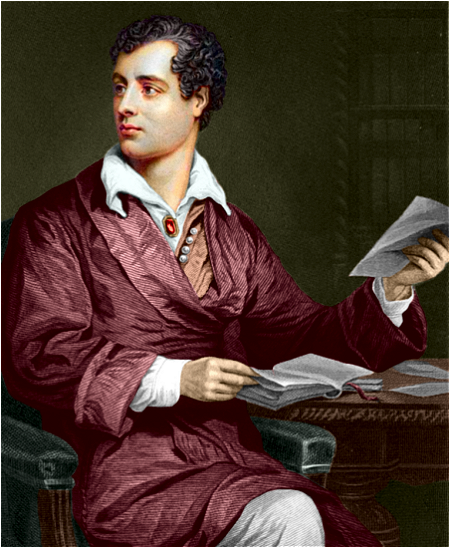
George Gordon Lord Byron
(London, 22 january 1788 – Mesolongi, 19 april 1824)
Darkness
I had a dream, which was not all a dream.
The bright sun was extinguished, and the stars
Did wander darkling in the eternal space,
Rayless, and pathless, and the icy Earth
Swung blind and blackening in the moonless air;
Morn came and went–and came, and brought no day,
And men forgot their passions in the dread
Of this their desolation; and all hearts
Were chilled into a selfish prayer for light:
And they did live by watchfires–and the thrones,
The palaces of crownéd kings–the huts,
The habitations of all things which dwell,
Were burnt for beacons; cities were consumed,
And men were gathered round their blazing homes
To look once more into each other’s face;
Happy were those who dwelt within the eye
Of the volcanos, and their mountain-torch:
A fearful hope was all the World contained;
Forests were set on fire–but hour by hour
They fell and faded–and the crackling trunks
Extinguished with a crash–and all was black.
The brows of men by the despairing light
Wore an unearthly aspect, as by fits
The flashes fell upon them; some lay down
And hid their eyes and wept; and some did rest
Their chins upon their clenchéd hands, and smiled;
And others hurried to and fro, and fed
Their funeral piles with fuel, and looked up
With mad disquietude on the dull sky,
The pall of a past World; and then again
With curses cast them down upon the dust,
And gnashed their teeth and howled: the wild birds shrieked,
And, terrified, did flutter on the ground,
And flap their useless wings; the wildest brutes
Came tame and tremulous; and vipers crawled
And twined themselves among the multitude,
Hissing, but stingless–they were slain for food:
And War, which for a moment was no more,
Did glut himself again:–a meal was bought
With blood, and each sate sullenly apart
Gorging himself in gloom: no Love was left;
All earth was but one thought–and that was Death,
Immediate and inglorious; and the pang
Of famine fed upon all entrails–men
Died, and their bones were tombless as their flesh;
The meagre by the meagre were devoured,
Even dogs assailed their masters, all save one,
And he was faithful to a corse, and kept
The birds and beasts and famished men at bay,
Till hunger clung them, or the dropping dead
Lured their lank jaws; himself sought out no food,
But with a piteous and perpetual moan,
And a quick desolate cry, licking the hand
Which answered not with a caress–he died.
The crowd was famished by degrees; but two
Of an enormous city did survive,
And they were enemies: they met beside
The dying embers of an altar-place
Where had been heaped a mass of holy things
For an unholy usage; they raked up,
And shivering scraped with their cold skeleton hands
The feeble ashes, and their feeble breath
Blew for a little life, and made a flame
Which was a mockery; then they lifted up
Their eyes as it grew lighter, and beheld
Each other’s aspects–saw, and shrieked, and died–
Even of their mutual hideousness they died,
Unknowing who he was upon whose brow
Famine had written Fiend. The World was void,
The populous and the powerful was a lump,
Seasonless, herbless, treeless, manless, lifeless–
A lump of death–a chaos of hard clay.
The rivers, lakes, and ocean all stood still,
And nothing stirred within their silent depths;
Ships sailorless lay rotting on the sea,
And their masts fell down piecemeal: as they dropped
They slept on the abyss without a surge–
The waves were dead; the tides were in their grave,
The Moon, their mistress, had expired before;
The winds were withered in the stagnant air,
And the clouds perished; Darkness had no need
Of aid from them–She was the Universe.
1816
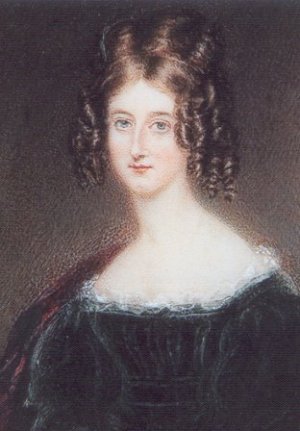
Stanzas to Augusta
I
Though the day of my Destiny’s over,
And the star of my Fate hath declined,
Thy soft heart refused to discover
The faults which so many could find;
Though thy Soul with my grief was acquainted,
It shrunk not to share it with me,
And the Love which my Spirit hath painted
It never hath found but in Thee.
II
Then when Nature around me is smiling,
The last smile which answers to mine,
I do not believe it beguiling,
Because it reminds me of thine;
And when winds are at war with the ocean,
As the breasts I believed in with me,
If their billows excite an emotion,
It is that they bear me from Thee.
III
Though the rock of my last Hope is shivered,
And its fragments are sunk in the wave,
Though I feel that my soul is delivered
To Pain–it shall not be its slave.
There is many a pang to pursue me:
They may crush, but they shall not contemn;
They may torture, but shall not subdue me;
‘Tis of Thee that I think–not of them.
IV
Though human, thou didst not deceive me,
Though woman, thou didst not forsake,
Though loved, thou forborest to grieve me,
Though slandered, thou never couldst shake;
Though trusted, thou didst not disclaim me,
Though parted, it was not to fly,
Though watchful, ’twas not to defame me,
Nor, mute, that the world might belie.
V
Yet I blame not the World, nor despise it,
Nor the war of the many with one;
If my Soul was not fitted to prize it,
‘Twas folly not sooner to shun:
And if dearly that error hath cost me,
And more than I once could foresee,
I have found that, whatever it lost me,
It could not deprive me of Thee.
VI
From the wreck of the past, which hath perished,
Thus much I at least may recall,
It hath taught me that what I most cherished
Deserved to be dearest of all:
In the Desert a fountain is springing,
In the wide waste there still is a tree,
And a bird in the solitude singing,
Which speaks to my spirit of Thee.
1816
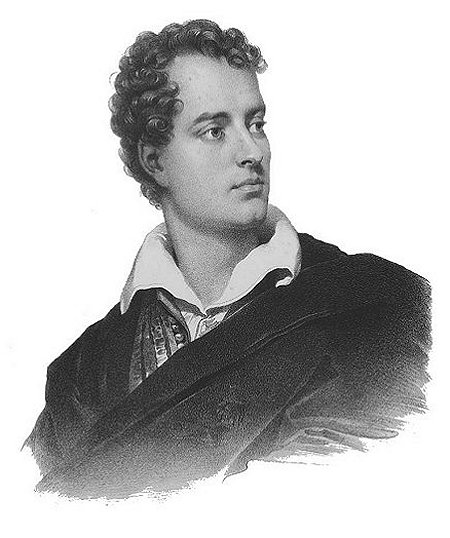
The Duel
1
‘Tis fifty years, and yet their fray
To us might seem but yesterday.
Tis fifty years, and three to boot,
Since, hand to hand, and foot to foot,
And heart to heart, and sword to sword,
One of our Ancestors was gored.
I’ve seen the sword that slew him; he,
The slain, stood in a like degree
To thee, as he, the Slayer, stood
(Oh had it been but other blood!)
In kin and Chieftainship to me.
Thus came the Heritage to thee.
2
To me the Lands of him who slew
Came through a line of yore renowned;
For I can boast a race as true
To Monarchs crowned, and some discrowned,
As ever Britain’s Annals knew:
For the first Conqueror gave us Ground,
And the last Conquered owned the line
Which was my mother’s, and is mine.
3
I loved thee–I will not say how,
Since things like these are best forgot:
Perhaps thou may’st imagine now
Who loved thee, and who loved thee not.
And thou wert wedded to another,
And I at last another wedded:
I am a father, thou a mother,
To Strangers vowed, with strangers bedded.
For land to land, even blood to blood–
Since leagued of yore our fathers were–
Our manors and our birthright stood;
And not unequal had I wooed,
If to have wooed thee I could dare.
But this I never dared–even yet
When naught is left but to forget.
I feel that I could only love:
To sue was never meant for me,
And least of all to sue to thee;
For many a bar, and many a feud,
Though never told, well understood
Rolled like a river wide between–
And then there was the Curse of blood,
Which even my Heart’s can not remove.
Alas! how many things have been!
Since we were friends; for I alone
Feel more for thee than can be shown.
4
How many things! I loved thee–thou
Loved’st me not: another was
The Idol of thy virgin vow,
And I was, what I am, Alas!
And what he is, and what thou art,
And what we were, is like the rest:
We must endure it as a test,
And old Ordeal of the Heart.

Stanzas
1
Could Love for ever
Run like a river,
And Time’s endeavour
Be tried in vain–
No other pleasure
With this could measure;
And like a treasure
We’d hug the chain.
But since our sighing
Ends not in dying,
And, formed for flying,
Love plumes his wing;
Then for this reason
Let’s love a season;
But let that season be only Spring.
2
When lovers parted
Feel broken-hearted,
And, all hopes thwarted,
Expect to die;
A few years older,
Ah! how much colder
They might behold her
For whom they sigh!
When linked together,
In every weather,
They pluck Love’s feather
From out his wing–
He’ll stay for ever,
But sadly shiver
Without his plumage, when past the Spring.
3
Like Chiefs of Faction,
His life is action–
A formal paction
That curbs his reign,
Obscures his glory,
Despot no more, he
Such territory
Quits with disdain.
Still, still advancing,
With banners glancing,
His power enhancing,
He must move on–
Repose but cloys him,
Retreat destroys him,
Love brooks not a degraded throne.
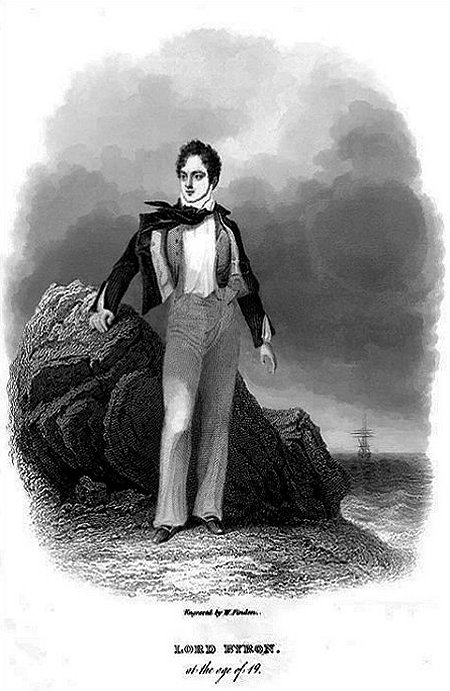
4
Wait not, fond lover!
Till years are over,
And then recover
As from a dream.
While each bewailing
The other’s failing.
With wrath and railing,
All hideous seem–
While first decreasing,
Yet not quite ceasing,
Wait not till teasing,
All passion blight:
If once diminished
Love’s reign is finished–
Then part in friendship,–and bid good-night.
5
So shall Affection
To recollection
The dear connection
Bring back with joy:
You had not waited
Till, tired or hated,
Your passions sated
Began to cloy.
Your last embraces
Leave no cold traces–
The same fond faces
As through the past:
And eyes, the mirrors
Of your sweet errors,
Reflect but rapture–not least though last.
6
True, separations
Ask more than patience;
What desperations
From such have risen!
But yet remaining,
What is’t but chaining
Hearts which, once waning,
Beat ‘gainst their prison?
Time can but cloy love,
And use destroy love:
The wingéd boy, Love,
Is but for boys–
You’ll find it torture
Though sharper, shorter,
To wean, and not wear out your joys.
1819
Lord Byron: Darkness & The Duel & Stanzas
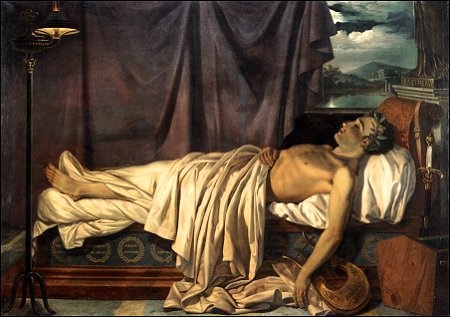
kemp=mag poetry magazine
magazine for art & literature
More in: Byron, Lord
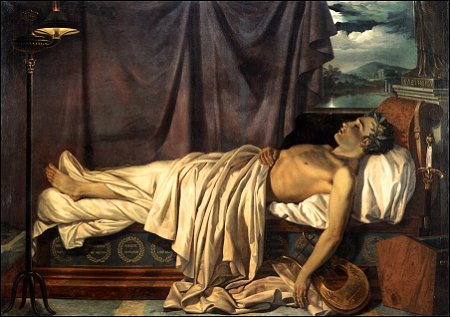
George Gordon Lord Byron
(1788-1824)
My Soul is Dark
My soul is dark – Oh! quickly string
The harp I yet can brook to hear;
And let thy gentle fingers fling
Its melting murmurs o’er mine ear.
If in this heart a hope be dear,
That sound shall charm it forth again:
If in these eyes there lurk a tear,
‘Twill flow, and cease to burn my brain.
But bid the strain be wild and deep,
Nor let thy notes of joy be first:
I tell thee, minstrel, I must weep,
Or else this heavy heart will burst;
For it hath been by sorrow nursed,
And ached in sleepless silence, long;
And now ’tis doomed to know the worst,
And break at once – or yield to song.
Poem of the week
September 28, 2008
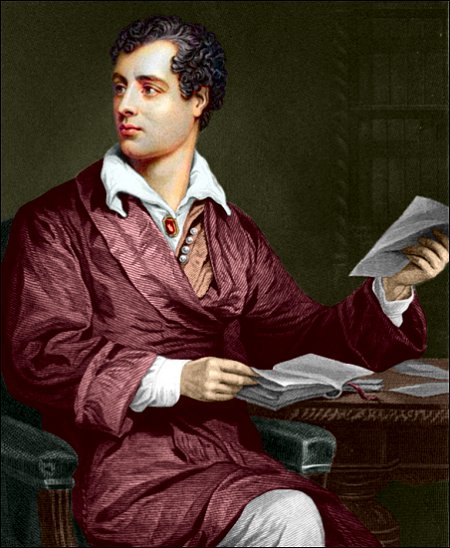
kemp=mag poetry magazine = www.kempis.nl
More in: Archive A-B, Byron, Lord
Thank you for reading Fleurs du Mal - magazine for art & literature